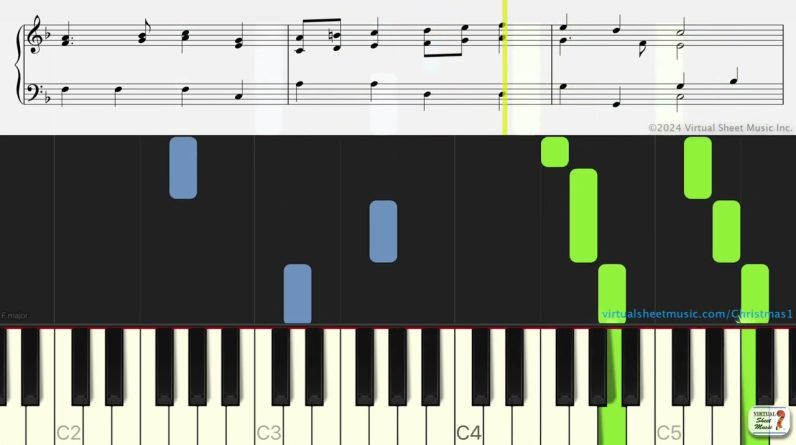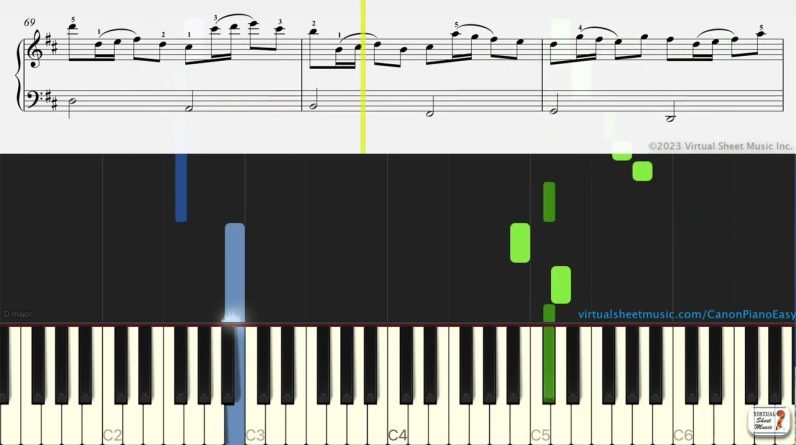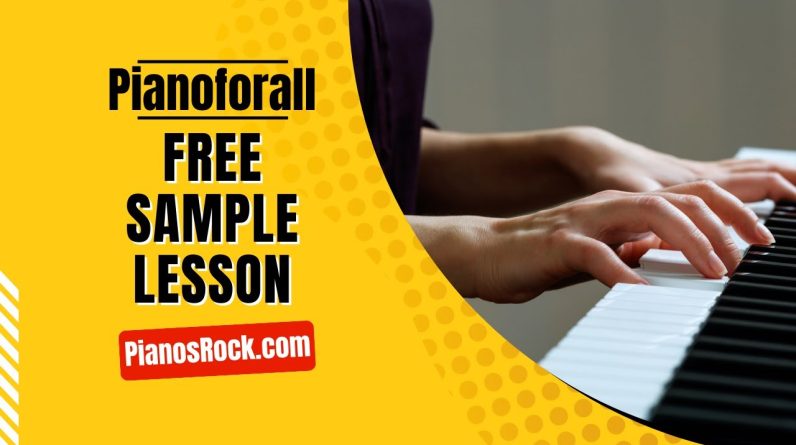Are you interested in learning how to play the piano? Well, you’re in luck because there are now piano learning apps available that can help you on your musical journey. In this article, we will explore the pros and cons of using these apps so you can make an informed decision about whether or not they are right for you.
When it comes to piano learning apps, there are definitely some advantages. For one, they are often much more affordable than traditional piano lessons. Plus, with these apps, you can learn anytime, anywhere. Whether you’re at home, on vacation, or even on your lunch break at work, you can pull out your phone or tablet and start practicing. Another benefit is the wide range of lessons available. These apps often have a variety of genres and skill levels, so you can find lessons that cater to your specific interests and needs.
Of course, there are also some downsides to consider. One major con is that these apps lack the personal touch that you would get from a live teacher. Without someone there to correct your mistakes or give you feedback, it can be easy to develop bad habits or miss out on important technique pointers. Additionally, some people find that they lack motivation when learning through an app. Without the accountability of a teacher or a group class, it can be harder to stay motivated and stick with your practicing.
So, as you can see, there are both pros and cons to using piano learning apps. While they may offer affordability and convenience, they may not provide the same level of personalized instruction as traditional lessons. However, if you’re a self-motivated learner and are willing to put in the time and effort to seek out additional resources, these apps can be a valuable tool in your piano learning journey. If you’re interested in giving one a try, click the link in the description for a free trial of Skoove, a popular piano learning app.
The Pros and Cons of Piano Learning Apps
Piano learning apps have gained popularity in recent years, offering a convenient and flexible way for individuals to learn how to play the piano. These apps provide a wide range of lessons, allowing users to learn at their own pace and according to their own schedules. However, like any learning method, piano learning apps also come with their own set of pros and cons. In this article, we will explore the benefits and drawbacks of utilizing piano learning apps, as well as provide insights into the importance of motivation, technique, and feedback in the learning process.
Affordability
One of the major advantages of piano learning apps is their affordability. Traditional piano lessons can be quite expensive, often requiring weekly payments for private instruction. On the other hand, piano learning apps usually offer monthly or yearly subscription plans, which are significantly more budget-friendly. These apps provide access to a multitude of interactive lessons, encompassing various levels from beginner to advanced. With the cost savings associated with piano learning apps, individuals can dedicate more resources to purchasing a quality keyboard or piano, enhancing their overall learning experience.
Availability 24/7
Another notable advantage of piano learning apps is their availability 24/7. Unlike traditional lessons, which are typically scheduled for specific times and days, piano learning apps allow users to practice whenever and wherever is most convenient for them. This level of flexibility is particularly beneficial for individuals with busy schedules or irregular commitments. Whether you’re a student, professional, or even a parent, having the ability to learn and practice the piano at your own pace and on your own time can significantly enhance your progress and consistency.
Wide Range of Lessons
Piano learning apps often boast a wide range of lessons, making it suitable for beginners, intermediate learners, and even advanced players. These apps usually have curated lesson plans that gradually progress in difficulty and cover various musical genres, styles, and techniques. From learning basic chords and scales to playing complex melodies and improvisations, piano learning apps can cater to individual preferences and interests. This versatility ensures that learners can explore different musical avenues and continuously expand their knowledge and skills.
Low Motivation
While piano learning apps have many advantages, one common drawback is the potential for low motivation. Learning to play the piano requires consistent practice and dedication, which can be challenging when using an app independently. Without the guidance and accountability provided by a teacher, learners may struggle to stay motivated and disciplined. This lack of motivation can hinder progress and impede the development of necessary skills. However, with the right mindset and self-discipline, individuals can overcome these hurdles and maintain motivation throughout their piano learning journey.
Lack of Emphasis on Technique
Another disadvantage of piano learning apps is the potential lack of emphasis on technique. Technique plays a crucial role in piano playing, as it determines the quality of sound produced and helps prevent injury or strain. Traditional piano lessons often prioritize proper hand placement, finger positioning, and body posture, ensuring that students develop good habits from the start. In contrast, some piano learning apps may not focus extensively on technique or provide sufficient guidance in this area. As a result, learners may unknowingly develop bad habits or struggle to execute certain pieces accurately.
No One to Correct Mistakes
One significant drawback of piano learning apps is the absence of a teacher to correct mistakes and provide personalized feedback. In traditional lessons, a teacher can identify areas where learners are struggling and offer guidance on how to improve. This personalized feedback is invaluable in helping students overcome challenges and refine their skills. In contrast, piano learning apps often rely on pre-recorded video lessons or digital interfaces that cannot offer the same level of individualized attention. While these apps provide demonstrations and explanations, users must rely on their own judgment to identify and correct errors.
The Importance of Motivation
Motivation plays a key role in the success of piano learning, regardless of the learning method employed. When individuals are motivated, they are more likely to practice regularly, engage fully in the learning process, and persist in the face of challenges. On the other hand, a lack of motivation can hinder progress and lead to frustration and disinterest. Therefore, it is essential to understand the significance of motivation in piano learning and explore strategies to maintain it throughout the journey.
Motivation as a Key Factor in Piano Learning
Motivation serves as a driving force in piano learning, keeping individuals focused and dedicated to achieving their goals. Whether someone’s aspiration is to play their favorite songs, perform in front of an audience, or simply enjoy the process of musical expression, motivation provides the necessary fuel to pursue these objectives. It inspires individuals to set aside time for practice, overcome difficulties, and continually strive for improvement. Without motivation, the learning process can become stagnant, and individuals may lose interest in pursuing their piano playing dreams.
How Lack of Motivation can Hinder Progress
When motivation declines, progress in piano learning may be adversely affected. Individuals may find themselves skipping practice sessions, lacking enthusiasm, or struggling to maintain consistency. As a result, the development of essential skills such as finger dexterity, coordination, and musical interpretation may suffer. Additionally, without motivation, learners may be more likely to give up when faced with challenges or setbacks, rather than persevering and finding alternate solutions. Therefore, it is crucial to nurture and maintain motivation throughout the piano learning journey.
The Significance of Technique
Technique is a fundamental aspect of piano playing, encompassing the physical skills required to execute musical passages accurately and expressively. It involves the proper use of fingers, wrists, arms, and body to produce a desired sound quality and maintain physical well-being. Without a solid foundation in technique, individuals may struggle to perform challenging pieces, experience tension or discomfort while playing, or develop bad habits that can impede progress. Therefore, it is critical to understand why technique is important and how it contributes to overall piano playing proficiency.
Why Technique is Crucial for Piano Players
Technique is crucial for piano players as it directly affects the quality of sound produced and the ease with which music is executed. With proper technique, individuals can achieve a balanced and controlled touch, enabling them to bring out the nuances and dynamics of different musical passages. Effective technique also minimizes the risk of injury or strain, as it promotes healthy and efficient movement patterns. Whether someone aspires to play classical masterpieces or contemporary compositions, a solid foundation in technique is essential for accurate and expressive piano playing.
How Learning Apps may Neglect Technique
Despite their many advantages, piano learning apps may not always prioritize technique in the same way that traditional lessons do. While these apps may provide demonstrations and explanations of fingerings and hand positions, they may not offer the same level of personalized guidance or attention to detail as an experienced teacher. In some cases, learners may unknowingly develop inefficient movements or rely on finger strength alone, rather than utilizing the principles of hand and arm weight. As a result, individuals may find it challenging to play more complex pieces accurately or experience physical discomfort due to poor technique.
The Role of Feedback in Learning
Feedback plays a crucial role in the learning process, providing valuable insights and guidance to learners. In traditional piano lessons, teachers offer immediate feedback, correcting mistakes, and offering suggestions for improvement. This feedback reinforces correct techniques, identifies areas for growth, and encourages learners to reflect on their playing. However, in the context of piano learning apps, the absence of a teacher can result in a lack of timely and personalized feedback, which can hamper progress and hinder the development of essential skills.
The Benefits of Corrective Feedback
Corrective feedback is particularly beneficial in piano learning, as it helps individuals identify areas for improvement and make necessary adjustments. Whether it is guidance on hand posture, timing, expression, or dynamics, feedback provides learners with specific insights into their playing. This feedback allows them to refine their technique, correct mistakes, and ultimately enhance the quality of their performances. Moreover, timely feedback can prevent the engraining of incorrect habits, ensuring that learners stay on the right track in their piano learning journey.
The Absence of Feedback in Piano Learning Apps
One of the notable drawbacks of piano learning apps is the absence of immediate feedback from a teacher. While these apps often include interactive features that simulate a classroom environment, they may not always provide the same level of individualized attention and personalized feedback. Learners may be left to their own devices to identify and correct mistakes, potentially reinforcing incorrect techniques or misunderstanding musical concepts. This lack of feedback can be a significant challenge for individuals trying to progress and improve their piano playing skills solely through app-based learning.
Exploring Skoove as a Piano Learning App
Among the plethora of piano learning apps available in the market, Skoove stands out as a comprehensive and user-friendly platform. Skoove offers a wide range of lessons designed for all levels of learners, from beginners to advanced players. The app utilizes interactive features, including real-time feedback on timing and accuracy, to enhance the learning experience. Skoove’s lessons cover various musical genres, focusing on both technique and musical expression. With its intuitive interface and comprehensive curriculum, Skoove presents itself as an attractive option for individuals looking to learn the piano via an app.
Overview of Skoove and its Features
Skoove provides a structured learning path for piano players of all levels. The app incorporates video-based lessons, interactive exercises, and real-time feedback to guide learners through their musical journey. Skoove’s curriculum focuses on building proper technique, mastering essential music theory concepts, and offering a diverse repertoire. The app’s user-friendly interface and step-by-step guidance make it accessible for individuals without any prior musical knowledge. Skoove also supports both desktop computers and mobile devices, offering convenience and flexibility to its users.
User Testimonials and Reviews of Skoove
Skoove has garnered positive reviews and testimonials from its users, emphasizing its effectiveness and user-friendliness. Users have expressed satisfaction with the app’s lesson structure, citing its clear explanations, engaging exercises, and progress tracking features as standout attributes. Many commend Skoove for its interactive feedback, which helps users improve their timing, accuracy, and technique. Additionally, users appreciate Skoove’s diverse range of lessons and songs, allowing them to explore various musical genres and styles. Overall, user reviews highlight Skoove’s ability to cater to learners of different levels and provide an enjoyable and effective learning experience.
>> Read Our Full Skoove Review Here
Comparing Piano Learning Apps with Traditional Lessons
When considering piano learning apps, it is essential to compare them with traditional lessons to understand their advantages and disadvantages. Traditional lessons offer the benefits of personalized guidance, immediate feedback, and tailored instruction. Teachers can address specific challenges faced by learners, adapt the curriculum according to individual needs, and provide motivation and accountability. However, traditional lessons are often more expensive and may require scheduling conflicts with other commitments. In contrast, piano learning apps offer affordability, flexibility, and a wide range of lessons but lack the personalized attention and immediate feedback provided by a teacher.
Personal Experiences with Piano Learning Apps
Personal experiences with piano learning apps can vary widely, depending on individual preferences, commitment, and dedication. Many individuals have found success in using piano learning apps as their primary method of learning, citing the affordability, convenience, and comprehensive curriculum as key factors. These individuals appreciate the flexibility of being able to practice at their own pace and explore various musical genres. However, others may face challenges, such as low motivation, difficulties with correcting mistakes independently, or the absence of personalized feedback. These challenges highlight the importance of self-discipline and a proactive approach to address gaps in learning when relying solely on piano learning apps.
Challenges Faced by Users of Piano Learning Apps
While piano learning apps offer numerous benefits, they are not without their challenges. One common challenge faced by users is the availability of self-discipline and motivation. Without the external accountability of a teacher or regular lessons, individuals may find it difficult to stay committed to consistent practice. Distractions, competing priorities, and lack of guidance can impede progress and hinder the development of necessary skills. Additionally, learners may face difficulties in correctly identifying and correcting mistakes independently, as they do not have a teacher present to provide immediate feedback and guidance.
Advice for Choosing a Piano Learning App
When selecting a piano learning app, several important considerations can help individuals make an informed choice. Firstly, it is essential to evaluate the app’s curriculum and ensure that it aligns with personal goals and musical interests. A diverse repertoire, comprehensive lessons, and a systematic approach to technique are crucial aspects to consider. Secondly, it is beneficial to assess the app’s user interface, responsiveness, and interactive features. A user-friendly and intuitive app can enhance the learning experience and motivate users to continue with their practice. Finally, checking reviews, testimonials, and recommendations from other users can provide valuable insights into the app’s effectiveness and user satisfaction.
Recommendations for Reliable Piano Learning Apps
Apart from Skoove, various other piano learning apps have gained popularity and have been positively reviewed by users. These include apps such as Simply Piano, Yousician, and Flowkey. These apps offer comprehensive lesson plans, interactive features, and diverse repertoire to cater to learners of all levels. Each app has its unique selling points, such as gamified learning experiences, personalized lesson recommendations, and extensive song libraries. Ultimately, the choice of a piano learning app depends on individual preferences, goals, and learning styles. Trying out different apps through free trials and comparing their features can help individuals identify the most suitable option for their piano learning journey.
Conclusion
In conclusion, piano learning apps have revolutionized the way individuals learn and approach the piano. With their affordability, availability 24/7, and a wide range of lessons, these apps offer a convenient and flexible alternative to traditional piano lessons. However, it is crucial to recognize the potential drawbacks associated with piano learning apps, such as low motivation, lack of emphasis on technique, and the absence of personalized feedback provided by a teacher. To overcome these challenges, learners can prioritize self-discipline, seek out additional resources for technique development, and utilize supplementary feedback platforms. With the right mindset, dedication, and a proactive approach, piano learning apps can be an effective tool for individuals embarking on their piano playing journey.
- Deck the Halls for Piano Solo – Christmas Sheet Music – Practice Video - November 20, 2025
- Canon in D by Pachelbel | Simplified for Piano Solo | Practice Video - June 22, 2025
- Pianoforall Free Sample Lesson - March 23, 2025
Contents
- 1 The Pros and Cons of Piano Learning Apps
- 2 Affordability
- 3 Availability 24/7
- 4 Wide Range of Lessons
- 5 Low Motivation
- 6 Lack of Emphasis on Technique
- 7 No One to Correct Mistakes
- 8 The Importance of Motivation
- 9 Motivation as a Key Factor in Piano Learning
- 10 How Lack of Motivation can Hinder Progress
- 11 The Significance of Technique
- 12 Why Technique is Crucial for Piano Players
- 13 How Learning Apps may Neglect Technique
- 14 The Role of Feedback in Learning
- 15 The Benefits of Corrective Feedback
- 16 The Absence of Feedback in Piano Learning Apps
- 17 Exploring Skoove as a Piano Learning App
- 18 Overview of Skoove and its Features
- 19 User Testimonials and Reviews of Skoove
- 20 Comparing Piano Learning Apps with Traditional Lessons
- 21 Personal Experiences with Piano Learning Apps
- 22 Challenges Faced by Users of Piano Learning Apps
- 23 Advice for Choosing a Piano Learning App
- 24 Recommendations for Reliable Piano Learning Apps
- 25 Conclusion








